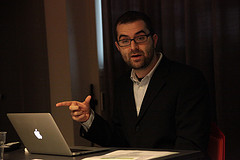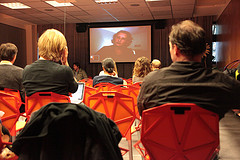By Serena Westra
Before the Pre-conference Seminar in Hilversum of the Economies of the Commons ended, a closing discussion with closing remarks and a short summary of the workshops was held. Ben Moskowitz was the first speaker who showed the results of the workshop.
 Ben Moskowitz gave a workshop with Michale Dale on Video on Wikipedia. According to Ben, they didn’t achieve anything tangible, but they did talk a lot about the possibilities and the future of video on Wikipedia. Three questions were addressed:
Ben Moskowitz gave a workshop with Michale Dale on Video on Wikipedia. According to Ben, they didn’t achieve anything tangible, but they did talk a lot about the possibilities and the future of video on Wikipedia. Three questions were addressed:
1. How do you build that pool of content?
There are some problems in the relationship with video and Wikipedia. Where does the content come from? Open archives have been discussed and open images. One of the problems is that ‘stuff just gets deleted by users’.
2. What should/will be the relationship between the encyclopaedia and video?
In the workshop we discussed the role of video on Wikipedia. Will it be illustrating, supplanting or something else?
3. Can the collaborative editing model of Wikipedia work with video?
The existing model of Wikipedia is based on a collaborative model in which users can add information, react to it and change it. But is that possible with video? And what would the social structures of that look like?
After a discussion, the group tried to work with video on Wikipedia. A part of the group uploaded two videos on Wikipedia. One of them replaced an existing article on the online encyclopaedia, as a small experiment how it works and how long it stands. The second video addressed a new subject on Wikipedia where no article existed yet, there is only a video now on the subject.
As you can see, there are a lot of questions when it comes to video on Wikipedia. Ben Moskowitz thinks that video can encourage visual learning, ‘that is the most exiting thing’. It can encourage education by having a pool of researchers. Video has to be free to use, free to share and able to give something back.
Ben finishes his presentation with a request: ‘Let us know what you want to see.’
The second workshop was about open distribution models for broadcasting. Peter Kaufman and Paul Keller moderated this session, but Bregtje van der Haak joined them through Skype.
 Bregtje is a film maker who made a lot of documentaries about the Arabic World. In the Skype talk she talked about documentaries that are entirely unencumbered by right restrictions. These videos had thousands of downloads, California Dreaming even broke down the server because it was so popular. The re-use online and the free content did not affect the sales. She explored the possibilities of a new studio and allowing people to create there own video.
Bregtje is a film maker who made a lot of documentaries about the Arabic World. In the Skype talk she talked about documentaries that are entirely unencumbered by right restrictions. These videos had thousands of downloads, California Dreaming even broke down the server because it was so popular. The re-use online and the free content did not affect the sales. She explored the possibilities of a new studio and allowing people to create there own video.
After the Skype interview, there were some questions addressed like: are there benefits when videos aren’t completely open? Why do we need to own things, own images? Who are our targets, a whole country or just movie makers? Paul Keller posed questions about a sort of master class, or perhaps even a studio.
The third workshop of the pre-conference was about HTML5 Video 101: exploring the possibilities of the HTML5 video element. Hay Kranen was the moderator and gave a small summary.
In the workshop they talked about the technical things on how you can use HTML5 for video. The problem with most existing software is that they all use different interface. HTML5 is simple and can be used on different media with one codebase for everything.
Paul Keller, the moderator of the closing session continues. ‘As you can see, it is not easy to get a discussion started about this three subjects and workshops, maybe we could instead have a discussion on the relevance of this event.’ With this event, the producers and speakers really tried to bring this discussion about open video. If you look at the American contributors, open video is really an American thing. The pre-conference was held in Hilversum to look how the people who come from the broadcasting environment react to it. It is more important than ever to combine the ideas of open video and traditional broadcasting video and come up with a good system in order to get the message out. It is a shame not too much Dutch broadcasters attended at the conference. Hopefully will the people who are here take this information back to their workplace instead.
He ends the day with a request: ‘I hope we can discuss some of the questions during this conference, or maybe even with drinks.’

